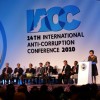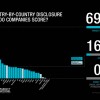Since 1992, 22 March has been World Water Day. In 2010 the United Nations General Assembly declared that clean drinking water is a fundamental human right. Yet millions of people in Sub-Saharan Africa still have no access to clean water. Lack of integrity and low performance of water utilities and informal service providers can jeopardise […]

Journee internationale de l’eau: s’attaquer a la corruption pour de meilleurs services dans le domaine de l’eau
Depuis 1992, le 22 mars est la journée internationale de l’eau. En 2010, l’Assemblée générale des Nations Unies a déclaré que l’accès à l’eau potable faisait partie des droits de l’homme fondamentaux. Pourtant plusieurs millions d’individus en Afrique subsaharienne n’y ont toujours pas accès. Le manque d’intégrité et les mauvaises performances des services et fournisseurs […]

150 countries have now ratified the anti-corruption convention
At the start of March Thailand and Iceland ratified the UN Convention against Corruption (UNCAC). UNCAC, signed in 2003, is a global framework for fighting corruption. In principle, countries agree to criminalise various corrupt acts such as bribery and embezzlement; they provide legal assistance to other countries bringing the corrupt to justice; they appoint independent […]
EU citizens need to know their rights to fight corruption!
On Friday, the European Ombudsman asked the question “Is the Lisbon Treaty delivering for citizens?” We here at the Transparency International EU office (‘TI EU’) indeed think that the Lissbon Treaty could deliver for citizens if the European Union (EU) were to implement a comprehensive EU information campaign on citizens’ fundamental rights. The Ombudsman has […]

EU budget transparency: Advocating better rules and practices
Transparency of the EU budget and its spending is of great importance for public control of the European Union, its institutions and bodies and the tens of thousands of beneficiaries of EU funds. Without knowing where EU money is spent and who receives it for what purposes, the prevention of misuse of EU funds, including […]

Depende de ti: TI’s new online game
Do you want to know how corruption affects the lives of a politician or a manager? Now you can! This week, we have launched online game Depende de Tí that gives you a little insight into the variety of decisions that have to be taken when you have the power to decide. And the influence […]

Corruption and the arms trade
This post has been written by Tobias Bock, Project Officer with Transparency International’s Defence and Security Programme. The one hundred and ninety two states of the United Nations spent last week negotiating a UN treaty to regulate the international arms trade. The Treaty’s purpose is “To elaborate a legally binding instrument on the highest possible […]

Oil wealth and revolution
Today Transparency International publishes its report on the transparency of oil and gas companies. The report shows that the majority of companies do not reveal payments to governments in countries where the extract oil and gas. A good example for what this means in practice is Libya: A quarter of the country’s economy come from […]
EU bank emerges from the shadows: EIB meets with civil society
Traumatised by voter rejection in a series of referenda, EU institutions are full of existential dread about the relevance of their mission to that mythical beast ‘the European citizen’. Consequently ‘engaging with civil society’ has become the platitude du jour of eurocrats, with even those working on the most arcane technical briefs pushed blinking into the sunlight of public scrutiny.
EU accession and member states should publish their UNCAC self-assessment reports!
The six EU accession and member states (Bulgaria, Croatia, Finland, France, Lithuania and Spain) that are part of the first year of the very first review cycle under the UN Convention against Corruption (UNCAC, see treaty text here) should follow the good example of those State Parties that have already made their self- assessment reports […]
- State Capture in South Africa 14 February 2017
-
 What’s next for Ukraine?
16 December 2016
What’s next for Ukraine?
16 December 2016
-
 Cleaning up sport: conflicts of interest at the top
9 December 2016
Cleaning up sport: conflicts of interest at the top
9 December 2016
-
 OGP: France must do more to tackle corruption
9 December 2016
OGP: France must do more to tackle corruption
9 December 2016
-
 Pharma companies in Slovakia: Uncovering conflicts of interest
9 December 2016
Pharma companies in Slovakia: Uncovering conflicts of interest
9 December 2016
-
Nokubonga Ndima: Young people can make a change for a better future...
-
Benjamin M: Very good article! Congrats!...
-
arun kottur: In India sports minister was involved decades are ...
-
Ekonomi: Very beneficial article. Thank you very much. htt...
-
ksweeney1: I do not agree that https://apex.aero/2016/09/22/g...
Search
Categories
Latest news from Transparency International
No items, feed is empty.


 Connect with us on Facebook
Connect with us on Facebook Follow us on Twitter
Follow us on Twitter